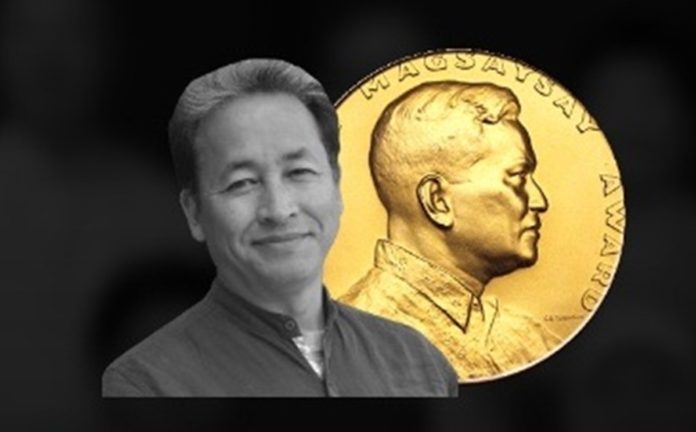SRINAGAR: Ladakh came to a standstill on Tuesday as a complete bandh was observed in protest against the detention of climate activist Sonam Wangchuk.
Wangchuk, known for his innovative environmental work, was detained by the Delhi Police after entering Delhi as leader of a protest to advocate for the inclusion of Ladakh under the Sixth Schedule of the Indian Constitution. The protest was spearheaded by the Leh Apex Body (LAB) and the Kargil Democratic Alliance (KDA), who have been at the forefront of a four-year-long agitation for greater autonomy and protection for the region’s indigenous population.
The bandh resulted in the closure of most shops, businesses, and other establishments across Ladakh. Demonstrations were held in both Leh and Kargil, with protesters expressing their anger at the government’s actions. In Leh, thousands of people gathered at NDS Stadium, voicing their support for Wangchuk and demanding justice. Chhering Dorje Lakrook, president of the Ladakh Buddhist Association, said the region was united in its stand against what he described as an “injustice” towards peaceful protesters advocating for a legitimate cause. He stressed that the demands for Sixth Schedule status, statehood, and employment safeguards were essential for preserving Ladakh’s identity.
In Kargil, similar protests were witnessed, with locals condemning the police action. Sajjad Kargili, a social activist from the region who was also detained alongside Wangchuk, issued a statement criticising the government. He revealed that the detained activists, including Wangchuk, were held at Arya Samaj Mandir in Narela, where they began an indefinite hunger strike in response to the detention.
“We are not traitors,” Kargili said, “we are frontline warriors demanding our rightful safeguards, statehood, and employment protections. It is unfortunate that while people like Ram Rahim are granted parole, the peaceful people of Ladakh are denied the right to protest.”
Kargili and Wangchuk’s detention, which took place at Delhi’s Singhu border on Monday night, was part of the Delhi Chalo Padyatra, a protest march that began from Leh on September 1, 2024. The march aimed to bring attention to the long-standing demands for Ladakh’s inclusion in the Sixth Schedule, which would grant the Union Territory greater autonomy and constitutional safeguards to protect the unique cultural, environmental, and economic aspects of the region. The padyatris walked the majority of the route but used buses while crossing poll-bound Haryana.
Their detention coincided with Gandhi Jayanti on October 2, a day symbolic of peace, democracy, and the right to non-violent protest. The protesters had intended to visit Mahatma Gandhi’s Samadhi in Raj Ghat to pay their respects but instead found themselves in police custody.
In a statement issued on Wednesday morning, Jigmat Paljor, Coordinator of the Leh Apex Body, criticised the Delhi Police for detaining the activists for over 24 hours without producing them before a magistrate, which he claimed violated legal protocols. “We find our rights trampled upon on a day that represents peace and democracy,” Paljor said, referring to Gandhi Jayanti.
Paljor further revealed that while some of the detained activists were briefly released late Tuesday night, they were re-arrested when they insisted on continuing their march towards the central part of Delhi. The detained activists, including Wangchuk, have continued their indefinite hunger strike in various police stations across Delhi, with some held at Bawana and others at Narela Industrial Area, Alipur, and Kanjhawala police stations. Paljor also disclosed that the activists’ phones were confiscated, leaving them cut off from the outside world.
The Leh Apex Body and the Kargil Democratic Alliance condemned the detentions, issuing a joint statement describing the police action as a violation of the fundamental rights to freedom of expression and assembly. The statement accused the central government of ignoring the legitimate demands of the Ladakhi people and warned that the continued disregard for their voices would only escalate tensions. “This is not just about statehood or Sixth Schedule,” Paljor said, “it is about the erosion of Ladakh’s identity, resources, and the democratic rights of its people.”
Mehbooba Mufti, president of the People’s Democratic Party (PDP), also expressed her dismay at the detentions. In a post on X, she criticised the central government for stripping Ladakhis of their fundamental right to protest, stating, “Even the very fundamental right to protest has been snatched from us for raising our voice against the onslaught on our identity and resources. We stand in solidarity with the people of Ladakh.”
The ongoing protests reflect deep-rooted frustrations in Ladakh, where the LAB and KDA have been demanding Sixth Schedule status, statehood, a separate recruitment process, and a public service commission for the Union Territory, along with separate Lok Sabha seats for Leh and Kargil districts. Despite repeated appeals to the central government, these demands have not been met, fuelling discontent among the people of the region.
As the bandh continued in Ladakh, Delhi Police defended their actions, stating that the protesters were initially released on Tuesday night but were re-detained when they refused to abandon their march towards the heart of the capital. A senior police official confirmed that Wangchuk and his fellow activists were detained at the Singhu border for violating prohibitory orders. However, the detained activists remain determined to press ahead with their demands, with the hunger strike continuing at multiple police stations.
The protests in Ladakh and the continued detention of Wangchuk and others highlight the growing tensions between the central government and the people of Ladakh, who feel increasingly marginalised in the ongoing political discourse. As the hunger strike persists, the Leh Apex Body and the Kargil Democratic Alliance have called for nationwide support, urging citizens across India to stand in solidarity with Ladakh in its fight for constitutional safeguards, statehood, and the protection of its identity.


